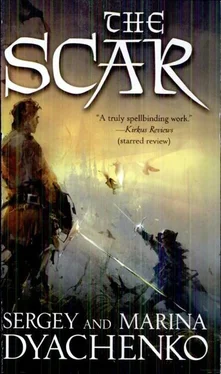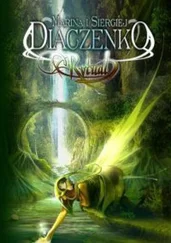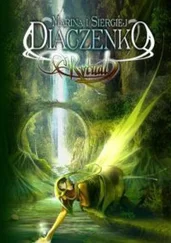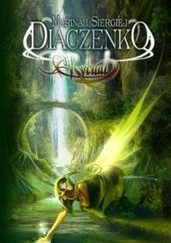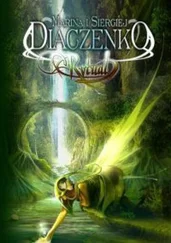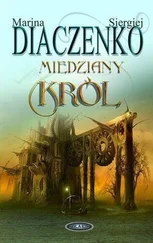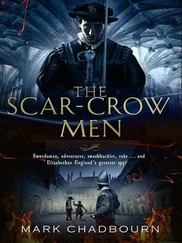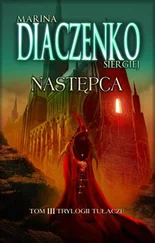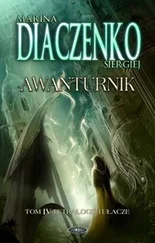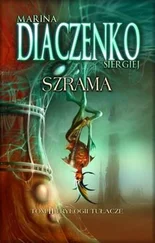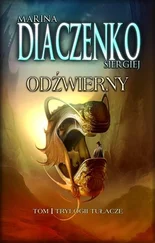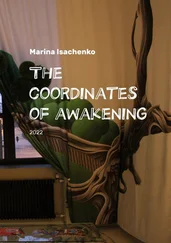Toria jerked in her captor’s hands. She was so close. Egert felt how the hands restraining her barbarically reopened the wounds left behind by torture, but she did not notice the pain. She emanated waves of fear for him, for Egert.
The swords crossed again. Fagirra opened his mouth halfway, his weapon again darted up, and then Egert, despising the barrier separating him from Toria, lunged into a counterattack.
It seems he yelled something. It seems someone in a gray robe dared to approach him from behind, Toria’s fear surged, and in the next second a bloodied thing fell heavily onto the dais, a thing that looked like a hand clutching a dagger. The tiny gibbet was swept away from the table, and the manikin slid out of the noose for the first time in many years. Then Fagirra’s sword flew out into the howling crowd, and Fagirra himself stumbled and fell; for a split second Egert looked down into his clouding eyes.
“Egert!”
Grubby hands were ruthlessly dragging her away. Egert bellowed indignantly and the short sword, won from an unknown guard, was already in flight.
The life of the city’s executioner, his gray, dull life, ended in an instant. Clutching at the hilt that protruded from his back, the poor soul lay down on the dais at the feet of his recent victim. Toria stepped backwards and Egert met her eyes.
Why has this happened to her? Blood, terror: why this? Poor girl.
He ran again, and she darted forward to meet him. He was already stretching out his hand when he saw that she was staring at something behind his back. He turned just in time: Fagirra was already there, his teeth bared in his crooked mouth and his stiletto raised high.
No, Toria, don’t be afraid. Never be afraid.
He managed to avoid the first attack, but the fencing master was strong and tenacious.
The stiletto almost grazed Egert’s hand a second time.
A weapon! Heaven, send me a sword, even a kitchen knife!
He stumbled and barely managed to keep to his feet. He could not let the stiletto get near Toria. One scratch would be enough; one scratch from the sharp tip, gleaming with a dark drop of poison, would be sufficient to kill her.
The pliers clanked under his feet. He felt their weight in his hands as he flung them up in front of his body to defend himself and Toria. Just as he heaved them up, Fagirra launched into a violent, frantic attack.
Egert did not want Toria to see this. He took a step back and put his arm around her shoulders and his palm over her eyes.
Fagirra was still standing. The pliers protruded from his chest, and the wide-open iron beak snarled at Egert with impotent menace. Egert knew that the bloodstained handles peered out of Fagirra’s back. The death agony of the robed man was terrible, and Egert pressed Toria into his arms, striving not to touch her painful welts.
Her face, half-hidden by his hand, seemed mysterious, as if it were under a mask. Her lips quivered like they were about to smile, her eyelashes fluttered against his palm, and for some reason he recalled the touch of a dragonfly’s wings.
It felt like the passage of time altered; his hand tentatively raised itself to his face, and his fingers wonderingly explored his cheek. They did not find the scar.
Incredible things were happening in the hall. The students were fighting and denouncing the robed men, tearing off their hoods.
Egert did not notice. The roar of the crowd receded then disappeared completely, as if he had gone deaf. His vision split in some strange manner; casting his eyes over the pandemonium, he saw only the tall old man with his wrinkled face.
The Wanderer slowly turned and walked toward the exit, slicing through the crowd the way a knife slices through water. He turned slightly at the threshold, and Egert saw his crystal-clear eyes close slightly, as if saying farewell.
* * *
The world is dissected by the horizon, and all roads rush toward its edge. They scatter beneath your legs like mice, and it is difficult to know if you are setting off on your path or if you have already returned.…
* * *
The crowd roared.
Outside, people rushed into the courthouse from the square, desiring to see the witness with their own eyes and to understand what had happened. Inside the courtroom, tensions were very high.
“Silence!” shouted the judge, and suddenly he dived under the table. The man in the gray hooded robe roared in horror, forcing the bloodstained stump of a hand against his chest. The students, overwhelmed by their own courage, pressed on the barrier of guards.
“I am the witness!” Egert shouted, his voice ringing over the noise in the courtroom. “Did you hear that? I am the witness, and I am telling you: The servants of Lash caused the Plague! Toria is innocent, she told the truth! Dean Luayan saved us all! Do not dare to accuse his daughter!”
The ring of guards pressed on the platform. People in red-and-white uniforms watched what was happening: The witness just killed two people in front of the court and the public.
Meanwhile the fight continued out in the hall, but the hooded disciples of Lash, used to discipline, became an army within few seconds. Daggers and stilettos arose from under the sleeves of gray robes. The students still screamed out threats and curses—but they retreated, pressed by a powerful gray wall. They were unarmed—only the boldest managed to snatch a candlestick or a fragment of a bench.
“Here are the criminals!” Egert moved forward. “Hold the Servants of Lash!”
People crowded around the platform, and the guards were unable to push them away. The people saw what happened, just as the guards did, and if no one felt sorry about the city executor, the terrible loss of Lash’s servant shocked and frightened everyone.
Egert tried to protect Toria: “She is innocent! Step back, everybody!”
An officer who survived the Plague and whose hair had become gray overnight moved forward, holding his naked sword: “Surrender, you murderer. The court will announce the verdict.”
The students were encircled by exposed blades like cattle in a slaughterhouse. The citizens, who only yesterday threw stones at the university, did not hurry to help them.
“Surrender,” the officer repeated grimly.
“You are not my enemy.” Egert looked into his eyes. “The Servants of Lash are the murderers! Here they are, arrest them in the name of the city!”
The officer ignored Soll: “Arrest him.”
The guards started to move in from three sides. For a second, Soll thought that he was observing the world with his ears, his skin, with the entire surface of his body; he saw Toria, frozen in horror, the corpse of Fagirra on the floor, the robed men with stilettos, students with broken noses, the judge on his knees crawling to the curtain. He saw the narrow door, behind which the sky turned blue and the crowd was roiling. He saw fear in the eyes of the guards approaching him … fear … but mixed with hope.
The guards moved toward him with ropes.
Egert smiled gently and took a step forward. He dived under their arms, tripping somebody’s foot, gripping sombody’s wrist wrapped in a leather glove, and pulled it over. He dropped this yielding body under the feet of his pursuers. Without looking, he struck the face of the guard who approached him from the rear with his elbow and managed to catch the sword of another guard after butting him with the top of his head. Someone in a red-and-white uniform tried to stop him—to his own dismay; Egert got hold of a second sword and jumped away.
The crowd in the courtroom made way for him in panic as he rushed toward the wall of gray robes.
The Servants of Lash backed up for a split second as death rushed upon them, death with a bloodred face and wild, fair hair. One of Lash’s men moved too slowly and Egert stabbed him in the face. The others inched forward, short blades glimmering, their eyes swollen and insane.
Читать дальше
